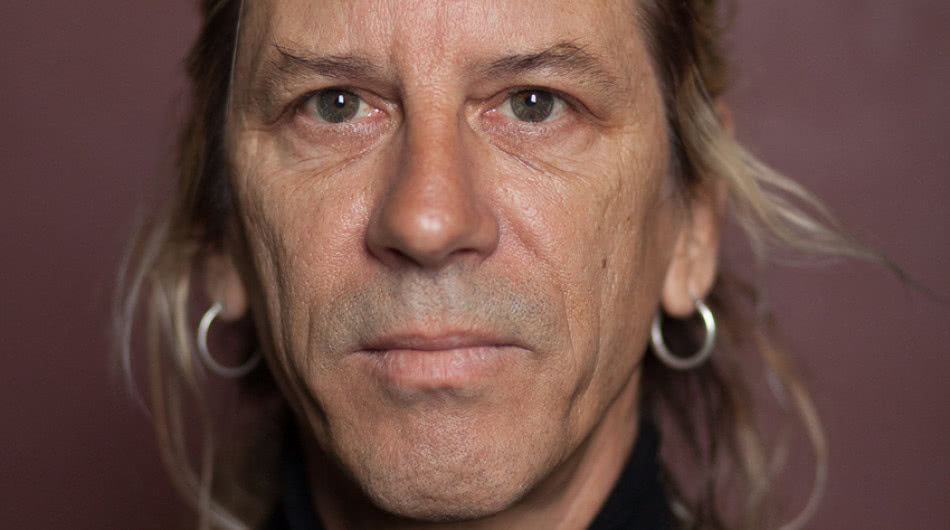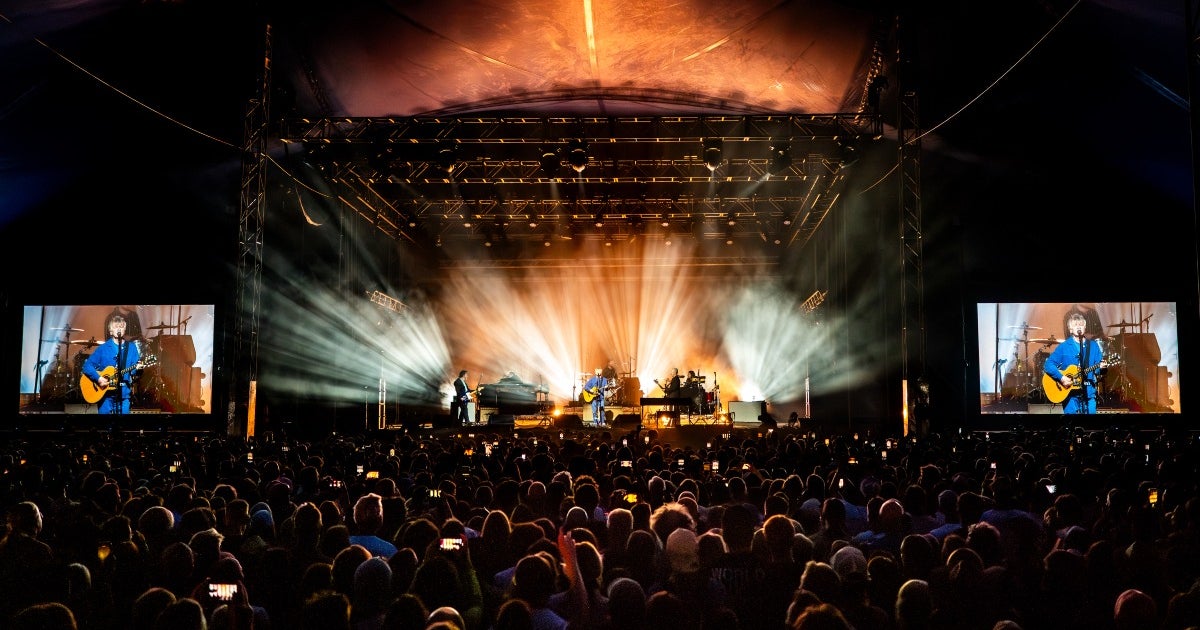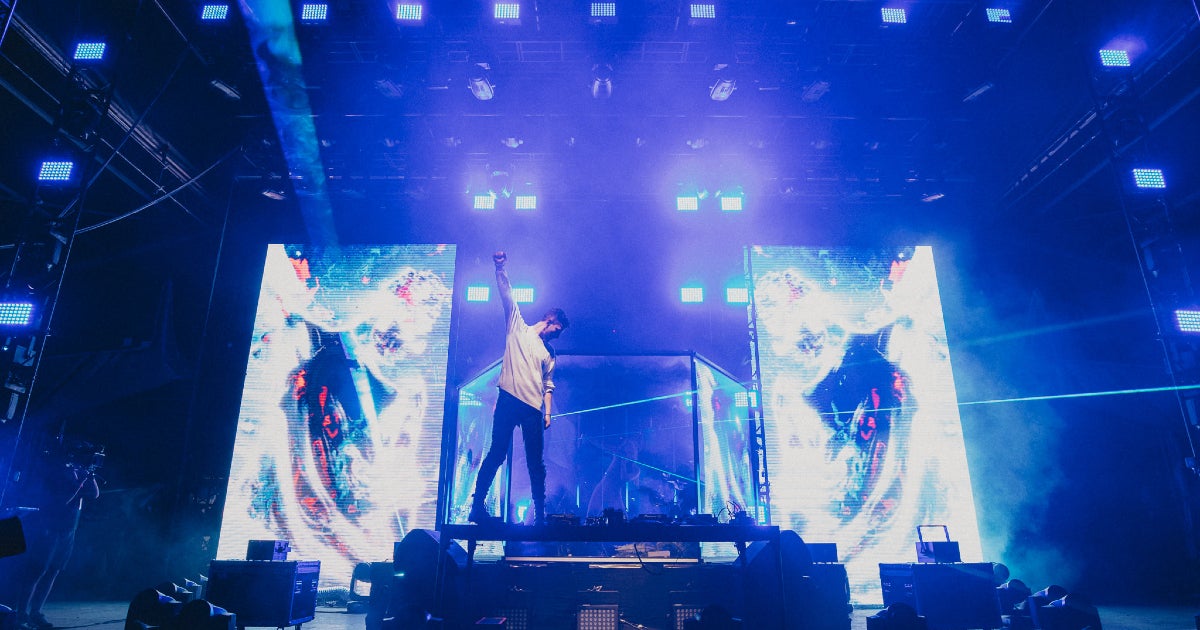William Basinski and the art of the infinite

20 minutes into Under The Skin, Jonathan Glazer’s 2013 extraterrestrial psychodrama, Scarlett Johansson lures a hapless punter to his death. She’s an alien; he’s a Scottish chav she’s found roaming the streets. She walks ahead, through an alleyway, and he follows, stripping off his shirt and hopping out of his jeans in leery expectation.
And then it happens, before you can really even process what’s going on. Suddenly, they’re not in Scotland anymore. They’re in this black space – pitch black, black as tar. And the punter isn’t walking; he’s wading, up to his nipples in some thick dark liquid that slowly, insistently, swallows him whole.
That’s what it can feel like listening to the music of William Basinski. At first, you understand the experience. Basinski is an ambient composer, and you know what ambient music is about: you’ve listened to Eno’s Ambient 1: Music For Airports, perhaps. And initially, nothing throws you. A record like The Disintegration Loops or Melancholia starts by meeting you where you live; gently, with a series of resonant, vibrating notes. But then it happens, just like that: you’re no longer walking. You’re wading. And then, all of a sudden, you’ve sunk.
Watch William Basinski talk A Shadow In Time:
What Basinski does is craft these little infinities. His acclaimed tracks – humming, transcendent loops that are sometimes gentle, and sometimes as quietly distressed as tin foil being pulled across a filling – don’t so much span time as they seem to neatly sidestep it altogether. That’s why, no matter how long his records might be, they always seem to end abruptly. You can imagine a work like The Disintegration Loops spiralling off forever; a record like A Shadow In Time racing to fill up the rest of your very life, and then even further, outpacing you, and heading off towards the horizon.
Which is somewhat ironic, given Basinski’s music is often – at least tangentially – about issues of the finite; of flesh degrading; of things aching towards their natural conclusion. As Slant’s Jonathan Wroble notes, A Shadow In Time is that most paradoxical of things: an infinite eulogy. A lot of Basinski’s tracks are, in their own way.
Which maybe makes Basinski’s practice sound overly serious, or precious, which it’s not. For all the things his music does – for all the power that it has – it is birthed gently, almost by accident. “A tape loop is a piece of recording tape,” Basinski explained to the Louisiana Channel in a filmed interview. “You can take a piece of that tape and cut it, and tape it together, and then you have a loop … Sometimes a kind of eternal perfection happens, and you can’t tell the beginning and the end. It seems to create a timeless amniotic bubble that you can float in.” He smiles; his ringed hands shoot out, indicating this great, striking sense of scale. “When that happens, I’m [like], ‘This is a good one.’”
This interview has been condensed and edited for clarity.
The BRAG: Do you write music every day, or is your creative schedule more relaxed?
William Basinski: What a romantic idea! I used to years ago when I was young and unknown. Now I have to spend a lot of time administering my label and catalogue, as well as dealing with email, interviews and touring schedule. I also just moved house after being in one place for 14 years, [bringing] a lot of stuff from 30 years in New York, so that was quite a couple of months. But I’m crazy about my new home in Los Angeles.
I am working on some new things. The new record for On Time Out Of Time is in production for an early 2019 release, and I have a new collaboration with Lawrence English coming out in the fall I’m quite excited about entitled Selva Oscura. The vinyl will come out on Temporary Residence LTD. Maybe a small pressing of CDs on 2062. We’ll see.
Do your tracks change a lot over the writing period, or do they generally stick to how you first conceived of them?
William Basinski: They do what they do and I try to do what they tell me.
Watch William Basinski talk to Louisiana Channel:
You’ve said that you started out experimenting with tape with a Walkman and some Sellotape. What is it that first drew you to using tape?
William Basinski: It was there and cheap.
I read you used to do a lot of field recording when you worked at [his New York thrift store] Lady Bird. Do you still do a lot of field recording?
William Basinski: Not so much when I had Lady Bird – that was before (and after). but I do love to capture ambient sounds around me. My previous back yard had some nice airplane and freeway drones and supersonic private jet blasts from the Santa Monica airport, as well as occasional end of the world sounding convoys of enormous and loud military helicopters escorting the two presidential Air Force Ones when the President comes to LA.
The new place is very quiet with lots of birds and a few planes at certain hours, but no freeway drones. I captured the amazing deep bass sound of a Cassowary getting up from a rest at an animal sanctuary in Brisbane the last time I was [in Australia] with Lawrence a few years ago. We sampled it and used it as the bass in a sick new track on the (maybe) upcoming jazzy/soundtracky/loungy/footwerky side project, SPARKLE DIVISION, I did with my young engineer, Preston Wendel.
Watch William Basinski talk to Popscotch.org here:
You’ve also talked about capturing ‘eternal moments’ with your music. Is there a fixed way to capture eternal moments, or do they happen more accidentally?
William Basinski: Run tape. Record everything, cut it up and see what happens.
A Shadow In Time uses a Voyetra 8 synthesizer. Where did you find the instrument? How quickly did you know that you were interested in using it to write a piece?
William Basinski: I first saw it demonstrated at Manny’s Music in Times Square in around ’82 when it first came out perhaps? I fell in love with the sounds but it was out of my budget.
A year or so later Jamie [Elaine], my partner, inherited a little money when his Dad sold his business and he bought me a used one a couple of years old. I think it was $2000, which was a lot of money to us at the time. I was making $1.25 an hour, which was minimum wage in those days! So it took working six days a week to pretty much pay the rent and bills on our loft. We didn’t go out a lot; we couldn’t afford to. We stayed in and created and had a ball doing it.
What is it like living in L.A.? Do you miss New York at all?
William Basinski: I miss my beautiful loft Arcadia, but those days are long gone. We had a lovely dreamtime there for almost 30 years in the two lofts. That NY is gone now. I miss my friends there. But I love the weather in LA, and like I said my new house is a dream I never thought I could attain. Every time I think, ‘this is mine?’ My hair stands on end. I call my new home “The Swimming Pool Library” after the Alan Hollinghurst novel my friend Chauncy gave me years ago.
Watch William Basinski perform an excerpt from Cascade here:
Are there any painters you are very much into at the moment?
William Basinski: Roger Justice, a mostly unknown NY serious painter who is brilliant and has been a close friend of Jamie’s and mine since the ’70s. I collect his work when I can. He’s not online and has rarely shown, but he’s come back from some very tough years and is painting up a storm again. He’s indestructible!
Of course, James Elaine [Basinski’s partner]. Jamie was just home from China to help with the move and before he left he hung a new art show from his nice little collection he has amassed over 20 years of curating emerging art first for The Drawing Center in NY, then at The Hammer Museum in LA. So we have a lovely new show up in the new house at the moment, but I’m bad with names and he didn’t have time to make me a list of the current pieces on the walls before he had to go back to Beijing to hang his next show at his gallery there, Telescope.
Anohni’s new paintings are wonderful. I would like to acquire a couple more of those, but I have a mortgage and bills to pay now. So buy CDs y’all! We are slashing prices on back catalogue CDs when I get home in July. Many of the prices are already slashed on the website MMLXII.com. We ship to the world. Unfortunately I can’t travel with LPs and CDs because I have to travel by myself and it’s too much weight and the LPs get damaged (TSA loves to open my luggage and repack it for me), so y’all have to order online. We pack very carefully and I ship to Australia all the time. And you get a signed letter and I’ll sign the merch if you ask.
What are you reading at the moment?
William Basinski: Amazing book: The Flamethrowers by the brilliant Rachel Kushner. Highly recommended: [it’s got] motorcycles, NY art world in the ’70s, Italy in WWI and II and the ’70s, motorcycles… I shouldn’t say more. Her prose is delicious.
Tell me something you’ve never told an interviewer before.
William Basinski: I am a mutant. I have webbed toes.
William Basinski performs as part of Room 40’s Open Frame at Carriageworks on Thursday June 28 and Friday June 29. For more BRAG longforms, read our chat with Courtney Barnett here.
The article was originally published on Brag Magazine




.jpg)